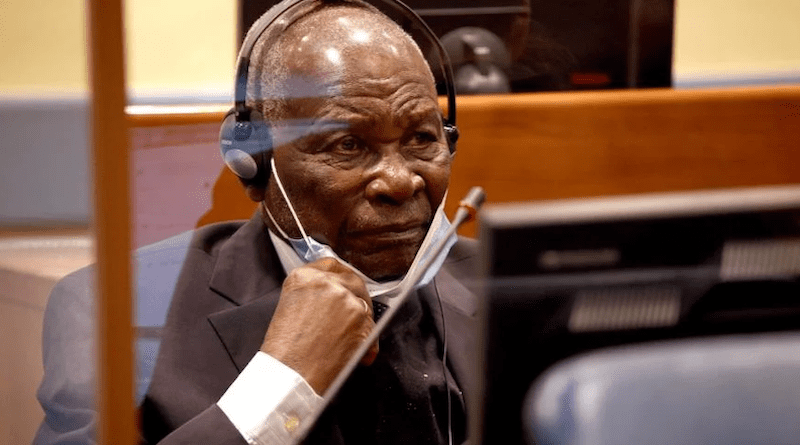Rwandan Genocide Suspect Rebuffs International Court Trying Hate Speech Crimes – OpEd
By IDN
By Lisa Vives
A Rwandan businessman and alleged genocidaire failed to appear in court, where he is being tried on charges of masterminding and financing the 1994 Rwandan genocide.
Felicien Kabuga, 87, is accused of aiding and abetting hit squads who slaughtered ethnic Tutsis and with using a radio station known as Radio Television Libre des Mille Collines to incite hatred, according to the charges filed before a UN tribunal at The Hague.
Some 800,000 people, mostly of the Tutsi minority, were murdered during the genocide of 1994.
At the trial’s opening, the presiding judge said Mr Kabuga had decided not to appear in court or to follow proceedings via video link from his detention centre.
Mr Kabuga issued a statement, saying the court had refused to let him choose his own lawyer and he had “no confidence” in his current legal representative.
Lawyers for Mr. Kabuga entered a not guilty plea for their client during a first appearance at the tribunal in 2020. They argued he was too frail to stand trial but judges ruled that the trial should go ahead but with shorter court sessions.
Once among Rwanda’s wealthiest and most influential people, Kabuga managed to escape for 23 years, living under ever-changing false names, switching countries and homes in Africa and Europe until he was finally arrested two years ago in a suburban apartment not far from Paris.
As the murderous campaign got underway, the radio station spurred on its listeners across the central African country. It broadcast information about where citizens should set up roadblocks and where to search for “enemies,” according to the indictment of Mr. Kabuga at the International Criminal Tribunal for Rwanda.
The charges against him include paying for training and distributing machetes and other weapons to the militia groups that drove much of the slaughter.
The trial with its focus on the consequences of hate speech could bring a larger than usual audience as the issue has assumed greater relevance in numerous countries that have limited free speech in a turn to the political right.
“This is also a rare case of a powerful economic actor, a rich businessman, being held accountable for the crimes they enabled,” said Stephen Rapp, a former chief of prosecutions at the Rwanda tribunal, which is holding the trial in The Hague.
In an earlier trial, judges had convicted two executives of the radio station and a newspaper owner for incitement to genocide and issued long sentences for spurring on the killing of 1994.
“The power of the media to create and destroy human values comes with great responsibility,” said the summary of the judgment issued in 2003. “Those who control the media are accountable for its consequences.”
The son of farmers, Mr. Kabuga started out peddling used clothes and cigarettes in his village in northern Rwanda. Gradually buying land and starting a tea plantation, he amassed a great fortune and influence in politics.
But Mr. Kabuga now argues that his wealth his gone, having been seized by the courts and frozen in Belgium and France. Suita have been filed by Mr. Kabuga’s 13 children demanding that the tribunal unfreeze most accounts because the assets belong to the bank.
The tribunal has been faulted by Human Rights Watch and other groups who say that it failed in its mandate to also prosecute the excesses of the Rwandan Patriotic Front whose members committed large-scale revenge killings during and after the genocide. At least 30,000 people, and perhaps as many as 50,000, were reportedly killed as a result.
In a separate development, Zimbabwean novelist, playwright and filmmaker Tsitsi Dangarembga has been found guilty by a court for inciting violence by staging a peaceful protest calling for political reform.
Dangarembga and co-accused Julie Barnes were convicted of participating in a public gathering with intent to incite public violence at Harare magistrates court on Thursday (September 29). The pair were each fined 70,000 Zimbabwe dollars. While the prize-winning author received a six month suspended sentence, she maintained that her case proved that the space for freedom of expression is shrinking and is being criminalized in Zimbabwe.
Dangarembga was arrested in July 2020 for holding a placard that read: “We want better. Reform our institutions” during a peaceful protest. Human rights organizations including Amnesty International and the writers’ association PEN International had called for the charges to be dropped.
PEN swiftly condemned the conviction on Thursday and called on the Zimbabwe authorities “to uphold their human rights obligations and desist from persecuting dissenting voices”.
The magistrate, Barbara Mateko, said the state had proved beyond doubt that the two had staged a demonstration with the intent to incite violence.
Prize-winning Dangarembga protested against the court’s decision and said she will appeal at the high court. Ms. Dangarembga is a novelist, playwright, and filmmaker. Her debut novel, Nervous Conditions, was the first to be published in English by a Black woman from Zimbabwe. It was named by the BBC in 2018 as one of the top 100 books that have shaped the world. She has won other literary honors.

